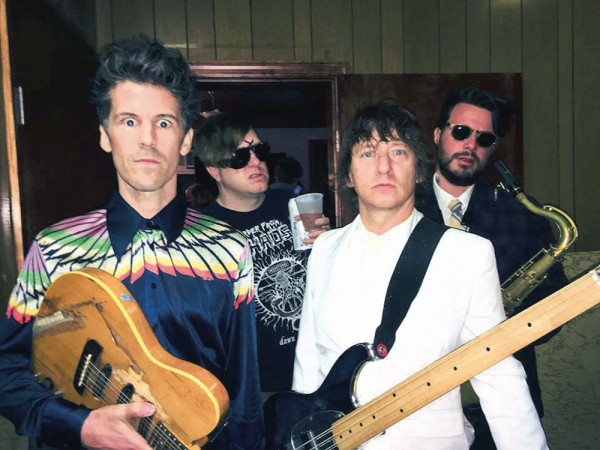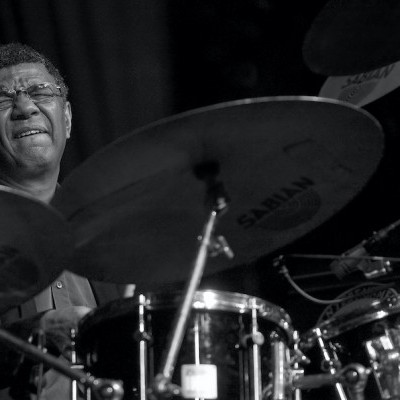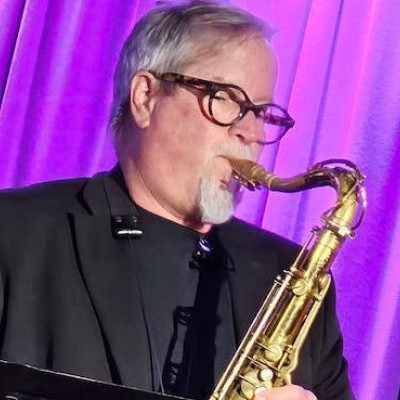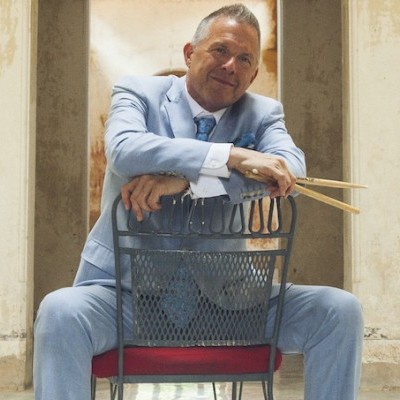Oct 28, 2025 10:47 AM
In Memoriam: Jack DeJohnette, 1942–2025
Jack DeJohnette, a bold and resourceful drummer and NEA Jazz Master who forged a unique vocabulary on the kit over his…

The Flying Luttenbachers—Brandon Seabrook (left), Weasel Walter, Tim Dahl, Matt Nelson—recently completed a European tour and issued the reconstituted troupe’s first album, Shattered Dimension, in more than a decade.
(Photo: Dominika Michalowska)Weasel Walter—an irreverent composer, improviser, drummer and bandleader—recently rebooted The Flying Luttenbachers, a malleable ensemble that combines a sludgy maelstrom of Ornette Coleman-inspired harmolodics, no-wave skronk, free-jazz mayhem and technical metal precision.
“I’m creating structure wherein these people can really be themselves and be as obnoxious, loud, crazy and virtuosic as they choose to be—and destructive,” Weasel recently said. “That’s really what The Flying Luttenbachers is about at this point: this sort of frat-boy, black-humored, punk-jazz aesthetic.”
But Weasel, 47, is already looking beyond the recently issued Shattered Dimension. A whirlwind of additional players who didn’t take part in the 2018 sessions could be enlisted for another new release set to be recorded this summer; the drummer and bandleader’s calling it his take on 1970s Miles records, “a sort of demented jazz-fusion record.”
Lounging on his couch in Ridgewood, New York, Weasel discusses the comeback, the band’s crushing new magnum opus and his personally handpicked ensemble, who are helping fulfill his cutthroat, musical vision. After lying dormant since its dissolution in 2007, the “brutal-prog” group he founded as a teenaged no-wave and free-jazz obsessive in Chicago during 1991 has made its improbable return.
The following his been edited for length and clarity.
What was the impetus behind restarting The Flying Luttenbachers?
I always did The Flying Luttenbachers to fulfill a hole I saw in culture, in terms of aesthetics. It was always diametrically opposed to what was popular out of necessity ... . The scene needed it in my opinion, because it was something I wanted to hear. Now, we’re back to this again. The impetus for this, especially the new band and the new album, is there’s just nothing like this right now that I know of, and I feel like that’s exactly why we’re doing it: to fulfill this big hole that I see.
So, it wasn’t like you had one big moment that lit a fire under you to reform the band?
I had made little noises about trying to regroup the Luttenbachers. Finally, someone in France wanted to have us play a festival, and they said they would book a whole week of shows for us. Frankly, it was an offer that was too good to refuse, moneywise. So, [guitarist Chris Welcome, bassist Tim Dahl] and I did a week of shows in France, culminating in an appearance at the Sonic Protest Festival in Paris. It went well; we played a long set of all the “hits,” or the songs that I could still stand to play.
At that point, did you have new material?
No new material at all. It was a liberal sampling of the stuff that I could still stomach from all the albums. The guys played well, there was really no problem. I, myself, still have a chip on my shoulder, so I was showing up and delivering the goods. But I felt a little nonplussed by playing the old stuff; I just don’t think it’s great to play it in 2019.
The Luttenbachers seems configured as a rotating cast of musicians, especially in recent concert settings.
The band is very flexible at this point, also out of necessity, and in the past year and a half, we’ve had quite a few people come through the ranks. We did 10 dates with Alex Ward on guitar, the British guitar player who I’ve worked with many times. He had his own way of looking at the charts and looking at the improvisations, and I encouraged him not to follow Brandon Seabrook’s lead from the album. Basically, everyone who plays in the group, I give them carte blanche to go as nuts as they want to. The attitude is almost “Go ahead, blow away everyone else on stage.”
I want it to be a battle royale of egotistical abstraction and just have people go as fucking nuts as they can.
Do you play all of Shattered Dimension live?
Pretty much, and we’ve been doing some free-improvisations on stage. We’ve started developing a language of cues, so it’s interesting, because it sparked a lot of ideas about what we could do. Part of the Luttenbachers thing is working with the ensemble and figuring out what the potential is and growing into that potential—not just forcing the band into a mold.
How was Ward’s style versus Seabrook’s? You also played some shows with another guitarist, Wendy Eisenberg.
Alex was different than Brandon. It was a totally different color, and I loved it. We just did three dates with Wendy, who is a young player I find to have a very unique energy. She’s very intelligent and she’s really nuts in the way that we’re also nuts. People were blown away by her.
It’s really about letting the players interpret everything the way they want to. For example, Brandon Seabrook, on the album, half the time he’s totally ignoring the parts that I wrote, and he’s just playing his own version of the music, which is totally acceptable. The same way that Alex’s perspective is different or Wendy’s perspective was different. That’s what I want now. I want to use iconoclastic musicians and I want them to speak through my music. I don’t want to control it and micromanage it.
There’s a lot of openness in the band, and we’re talking about doing projects with a lot of alumni and extra people, just because it’s whatever I say it is. It’s a very flexible thing. There are certain parameters that we follow: We’re generally dissident, asymmetrical, abstract, crude, loud and fast.
Those things will always hold true. DB

Jack DeJohnette boasted a musical resume that was as long as it was fearsome.
Oct 28, 2025 10:47 AM
Jack DeJohnette, a bold and resourceful drummer and NEA Jazz Master who forged a unique vocabulary on the kit over his…

“I’ve told students, ‘I don’t mind if you use AI for this or that project,’” says MIT’s Pascal Le Boeuf. “‘But you need to tell me.’”
Sep 18, 2025 11:14 AM
A standard joke when it comes to discussing artificial intelligence, or AI, is that it’s developing so rapidly that…

Chuck Manning Works for NASA … and plays jazz.
Sep 18, 2025 11:23 AM
Congratulations! After years of study, you’ve earned your degree in jazz performance. But let’s face it: Making a…

Always a sharp dresser, Farnsworth wears a pocket square given to him by trumpeter Art Farmer. “You need to look good if you want to hang around me,” Farmer told him.
Sep 23, 2025 11:12 AM
When he was 12 years old, the hard-swinging veteran drummer Joe Farnsworth had a fateful encounter with his idol Max…

“Make time and energy to meet people and make friends,” suggests Millie Ahearn, a student at DePaul University.
Sep 18, 2025 11:32 AM
For many students, the transition into a collegiate jazz program can feel overwhelming — new peers, unfamiliar…